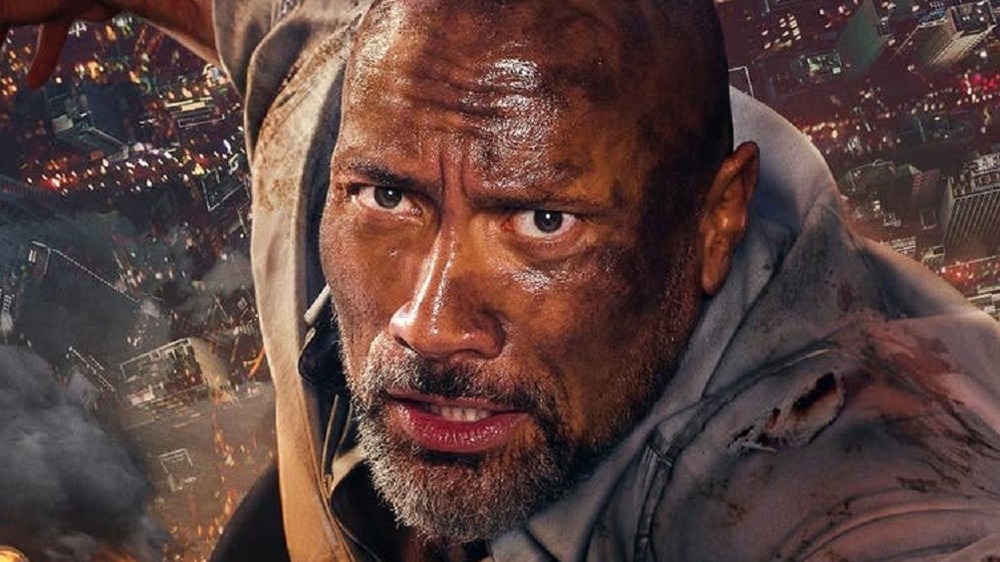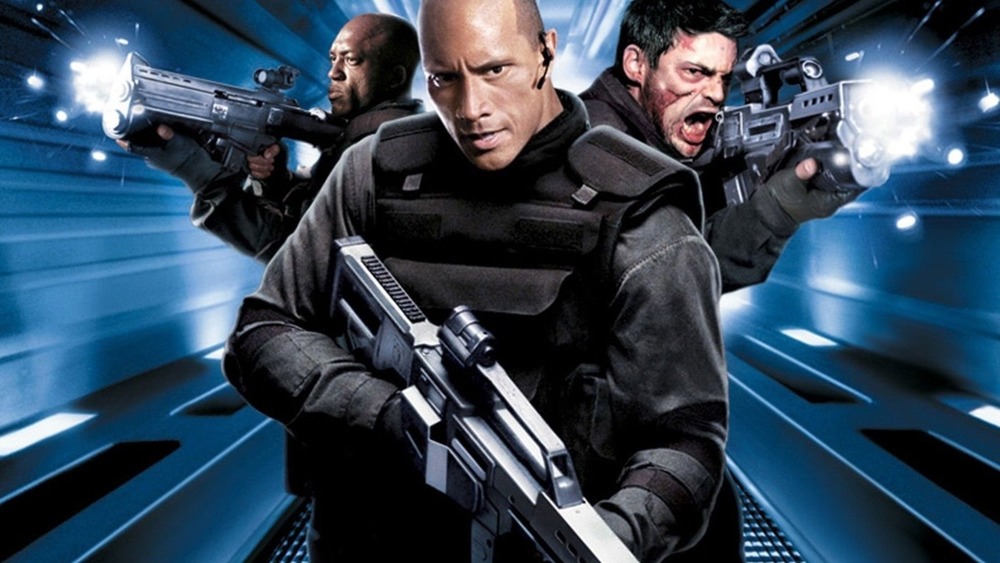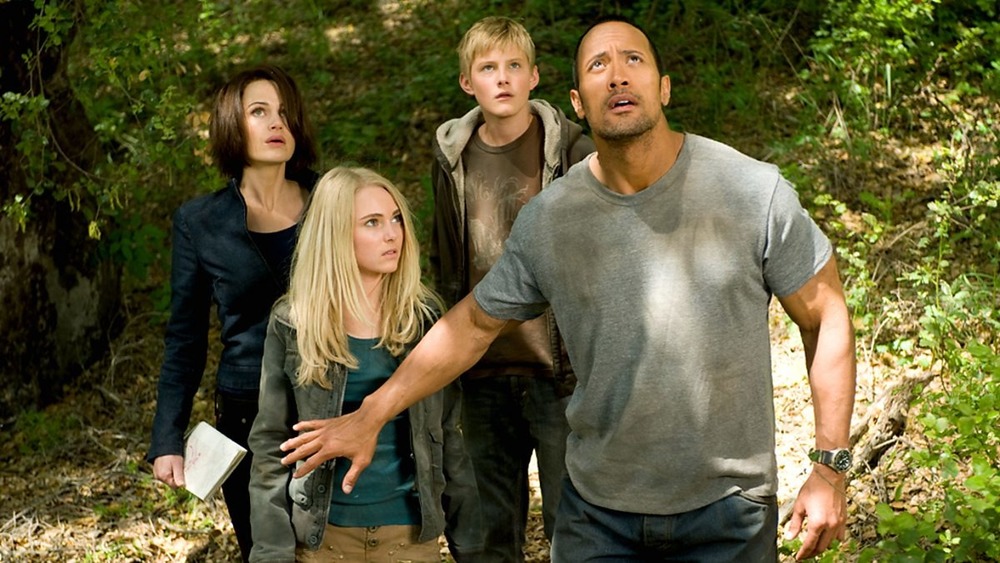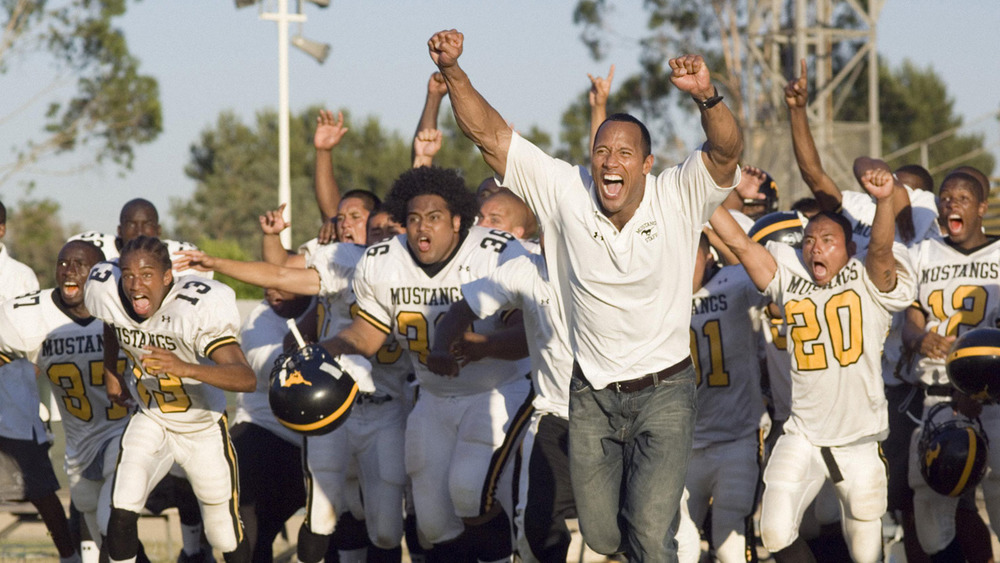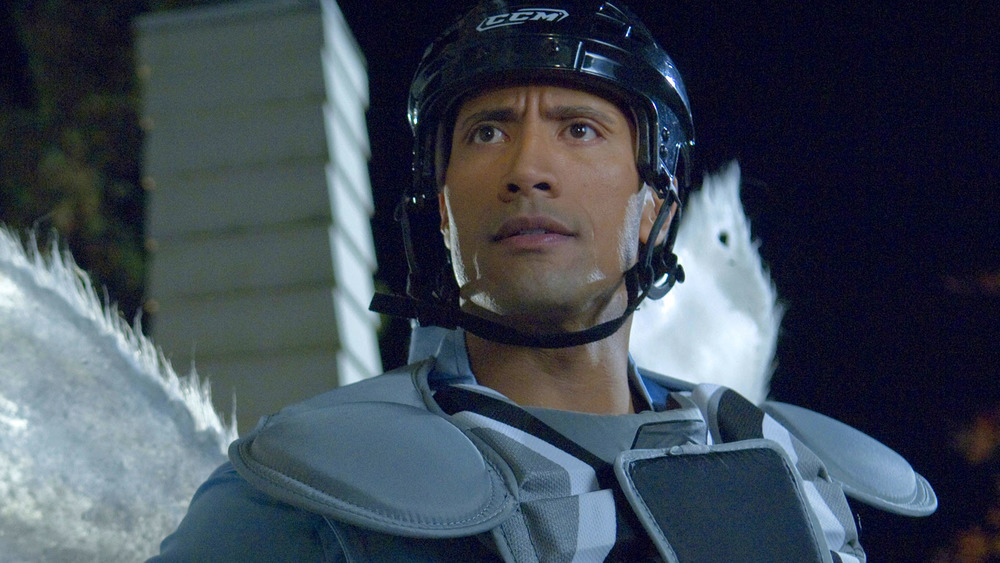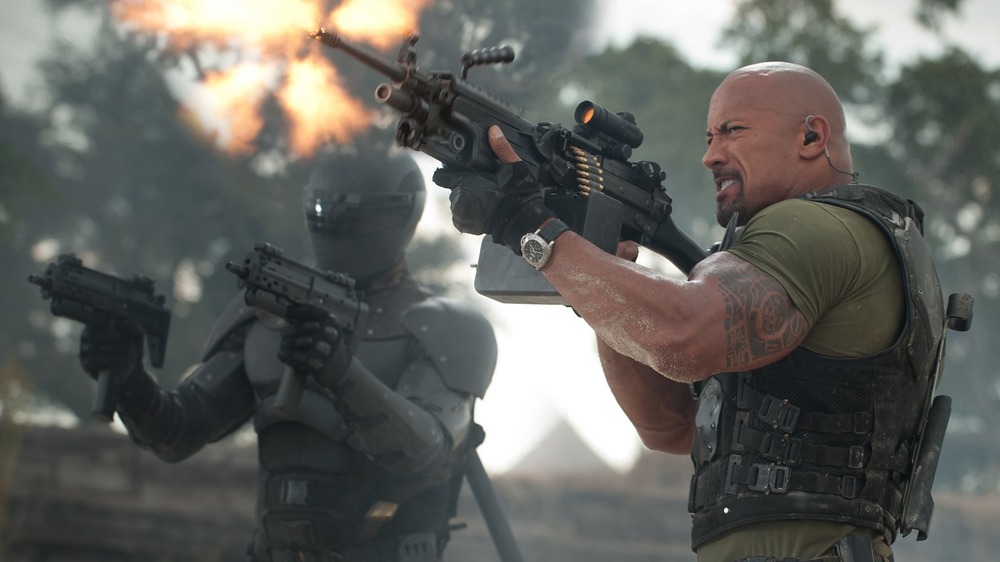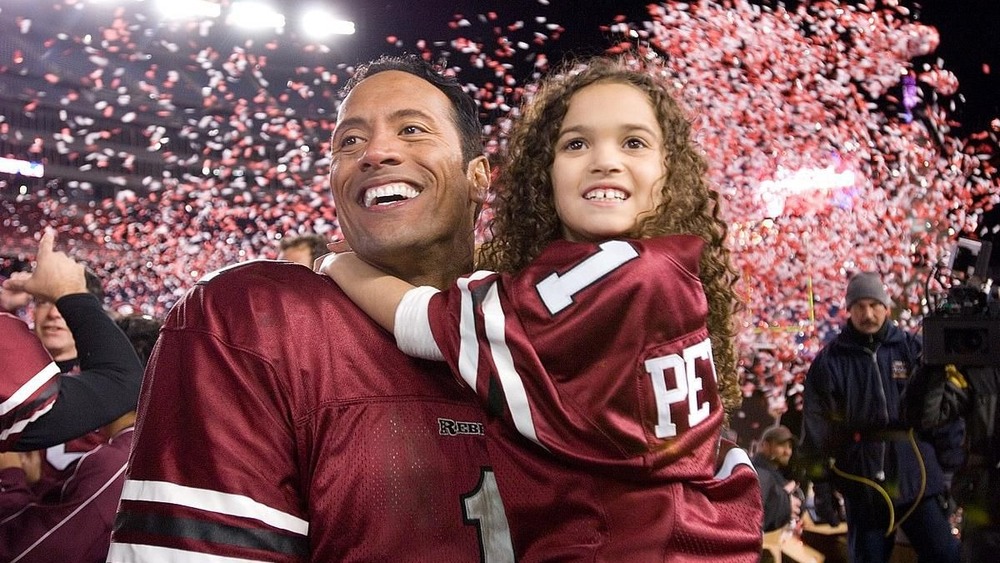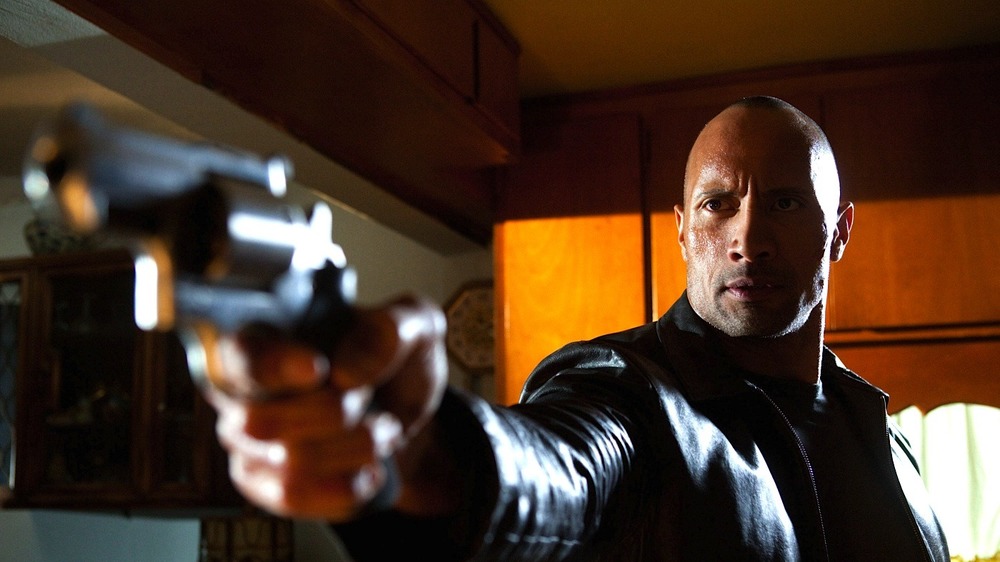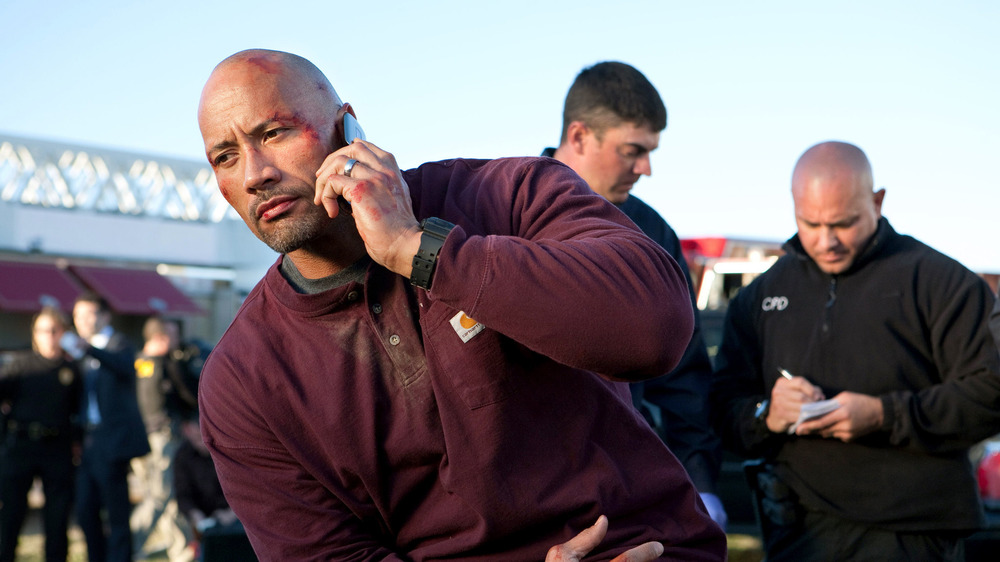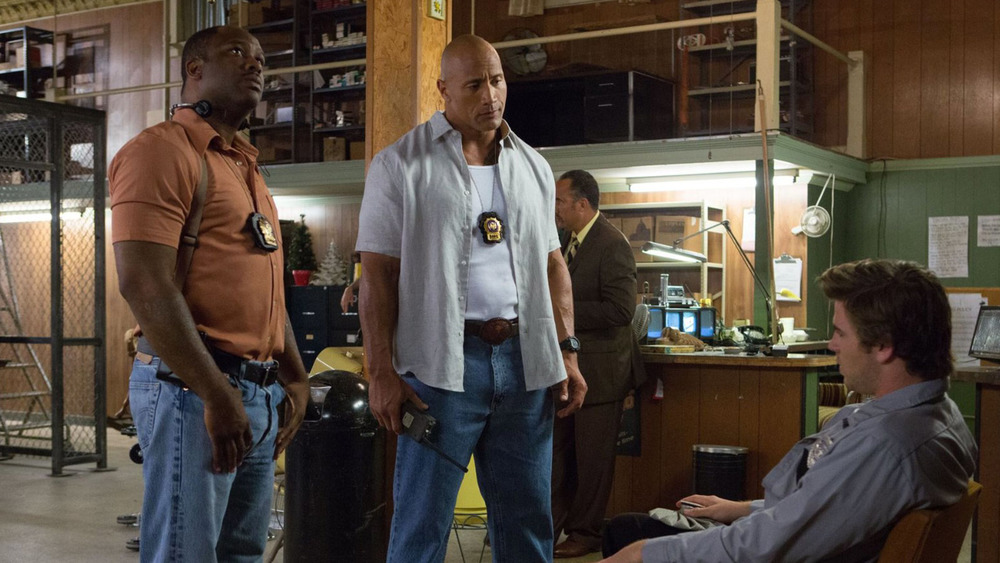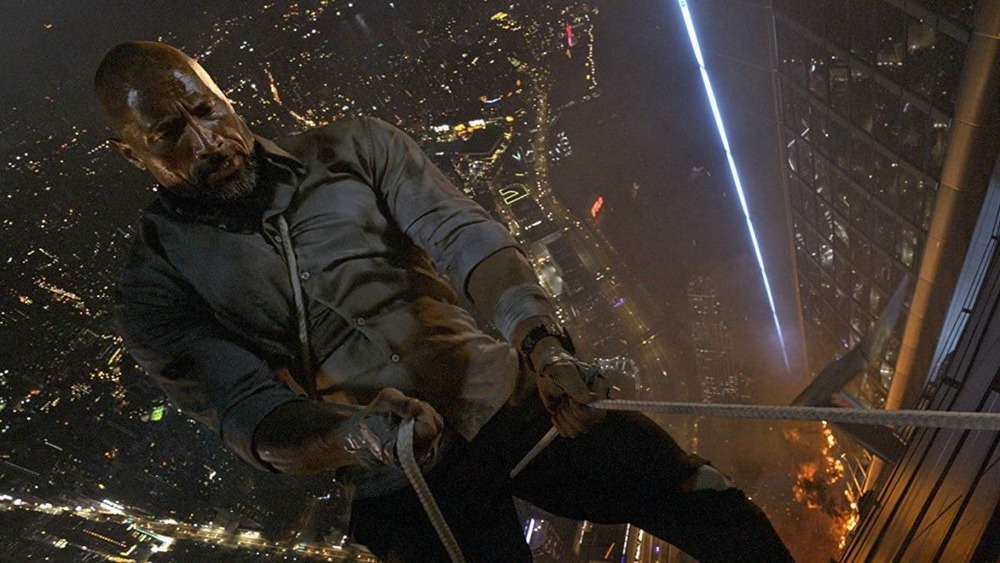The Forgotten Failures Of Dwayne Johnson
When you think of Dwayne Johnson, you think of Hollywood's biggest movie star. After becoming a famous face on WWE programming, Johnson transitioned into leading man territory with The Scorpion King. And with titles like Jumanji: Welcome to the Jungle and the various Fast & Furious movies under his belt, Johnson has become the face of massively lucrative franchises. Meanwhile, his ability to turn original fare like San Andreas and Central Intelligence into major hits makes him the rare modern movie star who can attract audiences without a pre-existing IP.
With these feats under his belt, it's no wonder that Johnson is seen as invincible. Still, there are no foolproof movie stars, and Johnson is no exception. Over the years, the actor has headlined his fair share of movies that haven't hit the bullseye with the general public. And worse still, they've disappeared from the pop culture consciousness. The reasons behind why these specific Johnson movies failed to move the needle vary greatly. In some cases, audiences didn't want to see Johnson in darker, edgier fare. Other projects failed due to generic premises that were always going to be difficult to make work, no matter whose face was on the poster. Whatever the reason, these forgotten failures serve as cautious anomalies in Johnson's overall strong track record as a leading man.
Dwayne Johnson met his doom in this forgotten failure
Video game movies don't have a good track record. It's only been in recent years with titles like Detective Pikachu and Sonic the Hedgehog that the subgenre has been able to find some level of critical success. Largely, though, video game movies have been cursed, littered with such high-profile duds as Assassin's Creed and Double Dragon. And if you want to seek out a movie that epitomizes why video game movies get such a bad rap, you don't need to look much further than a title like Doom.
The film already raised eyebrows from longtime fans of the source material when it ditched critical elements of the Doom mythology, like the presence of Hell. Of course, the flaws of Doom as a movie were so great that anyone, die-hard fans and novices alike, could critique it. Critics and audiences panned the production for limp action, lifeless characters, and a dearth of genuinely frightening scares. As a result, Doom ended up being a critical disaster and, worse for its producers, a box office dud. Debuting in October 2005, Doom grossed just $58 million worldwide on a budget of $60 million, a step down from Johnson's previous blockbuster vehicle, The Scorpion King. Doom failed in spite of being based on a well-known video game franchise and having the presence of Dwayne Johnson as the eventual main baddie. Not even a WWE titan like the Rock could escape the video game movie curse that has plagued so many motion pictures.
Race to Witch Mountain was a boring flop
Since the '90s, Disney has been remaking all their live-action kids movies. And if even That Darn Cat! got a remake, you could be certain that Escape to Witch Mountain was bound to get a revisit. Unlike many of these remakes, Race to Witch Mountain got some major star power in the form of leading man Dwayne Johnson. Playing a taxi driver who unwittingly becomes a helper to two adolescent aliens, the presence of Johnson made it clear that Disney was hoping Race to Witch Mountain wouldn't become the next Herbie: Fully Loaded.
But despite the fact that Johnson was coming off a streak of well-liked comedies, his presence wasn't enough to stop Race to Witch Mountain from being another forgettable Disney remake. Opening in March 2009, Race to Witch Mountain grossed only $106 million worldwide, with just a small portion of that sum coming from crucial overseas markets. The brand name of Witch Mountain just wasn't strong enough to turn Race to Witch Mountain into a must-see hit, while Johnson playing a straight man protagonist wasn't the role families wanted to see him in. It didn't help, of course, that reviews were largely indifferent to the feature, with Trevor Johnson of Time Out echoing many critics in observing that the film offered little new for either kids and adults. In the end, Race to Witch Mountain was simply another retread of a classic Disney film, and not even Dwayne Johnson could help make it go down any smoother.
Gridiron Gang scored zero touchdowns
Dwayne Johnson's modern-day film tastes lean towards big-budget spectacle. They're the kind of movies where Johnson fights massive crocodiles and earthquakes with his bare hands. Initially, though, Johnson headlined movies that were a bit smaller in scale. He did some R-rated comedies, an avant-garde project from Richard Kelly, and a 2006 sports drama entitled Gridiron Gang. This production saw Johnson starring with Xzbit and Kevin Dunn in a film chronicling the 1990 season of the Kilpatrick Mustangs. On paper, the underdog story seemed like just the thing that could make the next Remember the Titans, and Johnson's rousing screen persona seemed like a fine fit for a sports movie.
Unfortunately, Gridiron Gang was not well-received. Many expressed disappointment in how the film was bogged down by sports movie tropes. Scott Tobias of The A.V. Club observed that Gridiron Gang "seems like a clichéd, formulaic Hollywood version of the truth until documentary footage at the end makes it look as if real-life followed the script." Marrit Ingman of the The Austin Chronicle, meanwhile, flat-out said, "There's nothing special about this football yarn." A $41 million worldwide gross on a budget of $30 million also suggested that audiences were similarly unenthusiastic about Gridiron Gang. Not every sports movie is going to be the next Rocky or Miracle, but Dwayne Johnson's big foray into athletic films didn't even reach the heights of the more middling entries of this genre.
Yeah, Dwayne Johnson was the Tooth Fairy
Dwayne Johnson as the Tooth Fairy ... saying it out loud, it sounds like a Saturday Night Live sketch gone haywire. But Tooth Fairy was an actual big-budget movie that starred Johnson as a vicious hockey player who's drafted to become a tooth fairy after he crushes a child's dream. It was a production done in the style of past family movies like Jingle All the Way, where a rough-and-tumble action star plays the cuddly lead of a kids movie. Also like those older titles, Tooth Fairy didn't get a good response from critics.
Lou Lumenick of New York Post noted that Tooth Fairy's basic concept wasn't enough to sustain a whole movie, with the critic noting that the film "stretches the 20 or so minutes of plot provided by six credited screenwriters (bet there were at least six more) over 102 excruciating minutes." Further complaints revolved around Tooth Fairy's underwhelming comedy, the lack of good material for supporting performers like Billy Crystal, and especially how the film's protagonist was difficult to get invested in. Of course, movies like Tooth Fairy are made for box office bucks rather than to garner critical approval. On that front, though, Tooth Fairy still struggled to leave an impact. Tooth Fairy's $112 million worldwide total wasn't abysmal but still disappointing, coming in behind the box office grosses of past Johnson vehicles. Maybe the prospect of Johnson as the Tooth Fairy should've just stayed a bizarre logline.
Fans quickly forgot about G.I. Joe: Retaliation
Dwayne Johnson is known for stepping into franchises and taking them to the next level of success, particularly with the Fast & Furious movies. That series hit new box office highs once Johnson showed up in Fast Five, and his spinoff movie, Hobbs & Shaw, demonstrated that the franchise could sustain a whole universe. Paramount Pictures was looking for Johnson to bring a similar level of rejuvenation for the G.I. Joe series once the actor was called upon to headline the saga's second installment, Retaliation. But the result wasn't quite the franchise-savior the producers were looking for.
Retaliation did decent business at the box office, with a $375 million worldwide gross that handily out-performed its predecessor. Still, that was far beneath the box office hauls typical of lucrative summer blockbusters, and the film didn't leave much of an impact on moviegoers after its spring 2013 release. Worse, the critical reception was on par with, rather than an improvement on, its predecessor. Even with Johnson in the lead role, Retaliation couldn't rectify the complaints of derivative action and forgettable characters that had plagued the original G.I. Joe movie. Rather than reigniting the G.I. Joe saga, Retaliation kept it in the same gear. Not even Johnson and his penchant for reviving franchises could make Retaliation something meaningful to the general public.
Anyone remember The Game Plan?
The Game Plan is an odd contradiction in Dwayne Johnson's filmography. It helped launch him as a comedic leading man, but it's also now been largely forgotten by moviegoers. Even Johnson himself has referenced Southland Tales more often on his Instagram page in the last few years than he has The Game Plan. Meanwhile, Johnson's subsequent collaborations with Disney on bigger-budgeted tentpoles like Moana and Jungle Cruise have cast a large shadow. It's a shadow that a low-key kids' comedy featuring a slobbering bulldog can't hope to escape.
It doesn't help that the movie scored largely negative reviews, with heaps of criticism being delivered on how generic the film's comedy was. Critics could barely discern a difference between The Game Plan and other current live-action Disney comedies like The Pacifier. The Game Plan did at least work as a sleeper hit in its initial theatrical release, earning $147 million and pushing Johnson to further pursue comedic film roles in projects like Get Smart and The Other Guys. However, The Game Plan quickly left the pop culture consciousness after its theatrical run ended. Its long-term reputation also got damaged by Johnson's shifting career trajectory. Though he briefly became a kids' movie lead, Johnson quickly returned to PG-13 blockbusters with Fast Five, a terrain he's largely stuck to since. These qualities have helped to erase The Game Plan from the minds of moviegoers everywhere.
Dwayne Johnson didn't make any progress going Faster
After years of doing kids' movies and light-hearted comedies, Faster was Dwayne Johnson's return to high-octane action. An R-rated revenge thriller, Faster was meant to reaffirm that, though, he'd played The Tooth Fairy, Johnson was still a formidable force on the big screen. Unfortunately, Faster fell far short of accomplishing that. The movie sank without a trace in a blink-and-miss-it theatrical run that kicked off over Thanksgiving 2010.
Opening the grim Faster in the wake of more lighthearted, adult-skewing fare like Unstoppable and Due Date wasn't a great idea, but Faster was really done in by its derivative marketing campaign. Faster offered no unique personality traits for its lead character, no distinct setting to place him in. Even his revenge quest was like something out of a Death Wish knock-off from the 1980s. It didn't help that Faster hailed from CBS Films, which had only been releasing movies for about ten months at that point. Their inexperience with launching successful films of any stripe, let alone action movies, meant that Faster didn't have the kind of support that past Johnson movies had gotten from major studios. These problems helped to ensure that audiences stayed away from Faster, and the film's mixed critical reception didn't do it any further favors. All in all, Faster's lackluster performance on all fronts made it a less than thrilling action movie comeback for Dwayne Johnson.
Snitch didn't stick around for long
Johnson had a busy 2013 as he headlined four different wide releases in the span of just a few months, including Pain & Gain and Fast & Furious 6. But the first one of these 2013 titles was a smaller-scale film called Snitch. The story of a man who goes undercover in the world of drug trafficking to help reduce his son's jail sentence, Snitch got stuck in a strange no man's land for action thrillers — neither bad enough to be memorably inept nor good enough to be a surprise hit.
Instead, Snitch settled for mixed reviews, which praised Johnson's commitment to his complex role but felt that director Ric Roman Waugh struggled to properly execute both the action sequences and an appropriately intense tone. The lack of exceptional reviews or distinctive marketing meant that Snitch drummed up merely an okay box office at the tail end of February 2013. Neither its reception nor its earnings were enough to make Snitch stand out among Johnson's leading man vehicles as a whole, let alone the various features Johnson had lined up for 2013. With three additional motion pictures coming out right on the heels Snitch – all of them hailing from bigger studios and more well-known filmmakers — it was no wonder this little thriller got overshadowed that year.
Empire State was a direct-to-video failure
Looking over Dwayne Johnson's movies post-2010, there's a logic to why he appeared in each of them. Even if the films themselves ended up flopping, it's easy to see why, on paper, he would be attracted to titles like Hercules or Baywatch. The one exception to this is Empire State, a Johnson/Liam Hemsworth crime thriller that took the former WWE wrestler to territory he's largely avoided in his two decades as a leading man — direct-to-video cinema.
While many wrestlers turned movie stars start out in direct-to-video fare before graduating to theatrical films, Johnson was a big-screen attraction from the start in his dialogue-free turn in The Mummy Returns. That makes it all the more puzzling he'd take on Empire State, especially since his career was doing fine at the time. He hasn't talked publicly about Empire State, so it's impossible to tell why he signed on for this indie feature from director Dito Montiel (a filmmaker he hadn't previously worked with). That only heightens the bewildering sight of seeing Johnson circa. 2013 headlining a movie sent straight to Redbox, a sentiment echoed in coverage of the film leading up to its release.
But the spectacle of seeing Johnson in direct-to-video fare wasn't enough to make Empire State something people actually wanted to see. It's only grossed $4 million in video sales and got trashed critically (by the few critics who watched it). Johnson has stayed in the world of theatrical features since, making Empire State an oddball entry in Johnson's modern filmography.
Dwayne Johnson didn't reach new heights with Skyscraper
Universal wasn't skimping on cash when they kicked off the marketing campaign for Skyscraper. The movie introduced itself to the general public with a bang thanks to a Super Bowl commercial and then a full trailer during Jimmy Fallon's post-Super Bowl Tonight Show. It was a lavish beginning to Skyscraper's marketing that was supposed to establish the project as one of the biggest must-see movies of 2018. However, such stunts weren't enough to ensure the film achieved box office success. In fact, among Johnson's modern-day blockbusters, Skyscraper is one of his lowest-grossing efforts.
Over its domestic opening weekend, Skyscraper grossed just $25 million, one of the lower opening hauls for a recent Johnson action movie. It was an unexpected development that sent box office analysts scrambling to figure out how Skyscraper had missed the mark so badly. The failure was largely attributed to a crowded July 2018 schedule (Skyscraper opened in between new Ant-Man and Mission: Impossible movies), as well as Johnson appearing in several other films in the preceding year. With Jumanji: Welcome to the Jungle and Rampage fresh in people's minds, there wasn't as much novelty to Skyscraper. These issues meant that Skyscraper's box office run didn't improve from that underwhelming opening, as it went on to gross just $304.9 million worldwide. Neither critics nor audiences really responded to the film, leading to it vanish from the pop culture radar rather quickly, despite all those big promotional stunts.
